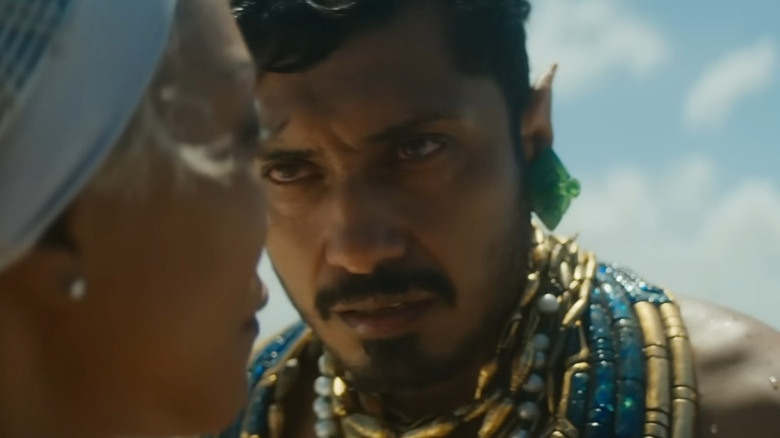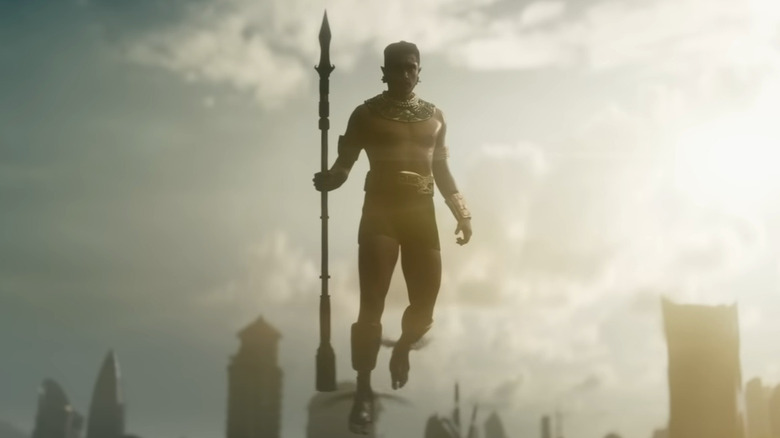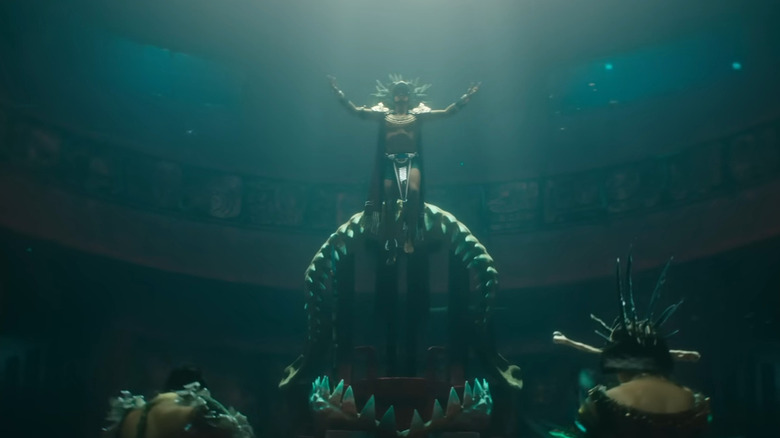Black Panther 2 Confirms Namor Is The First & Oldest MCU Mutant (So Far)
Contains Spoilers For "Black Panther: Wakanda Forever"
After introducing more characters than any stretch in narrative history, the fourth phase of the Marvel Cinematic Universe has finally come to a close with the official release of "Black Panther: Wakanda Forever." Sure, the quasi-closing chapter primarily focuses on familiar figures, but the sequel to Ryan Coogler's box office success still finds time to drown its audience in a veritable ocean of new IP. Riri Williams (Dominique Thorne), a.k.a. Ironheart, the comics canon hero who steps in for Tony Stark (Robert Downey Jr.), a.k.a. Ironman, makes her big screen debut, as well as do the Midnight Angels, even if they're just a splinter faction of the Dora Milaje.
Then, of course, there's Namor (Tenoch Huerta), the king of Talokan, an underwater kingdom in the North Atlantic ocean. If that sounds a lot like Atlantis, a rather more famous underwater kingdom, that's because it's supposed to. The comics canon version of Namor does rule over Atlantis, but with the casting of Huerta — and the moderately successful release of DC's "Aquaman," which also centered around a half-human (more on that later) king of Atlantis — it seems that Marvel chose to carve out a new history for the role. That being said, Marvel didn't change everything. Some aspects of his original story remain untouched and, in leaving these facets intact, Namor became another, and technically the first, link to the eventual "X-Men."
Namor, the mutant king
the "X-Men" are a group of characters within Marvel's UNIVERSE that, rather than obtaining their powers through a spider's bite or a super soldier serum, obtained the powers through evolution. These characters were born mutants. Canonically speaking, mutants are RARELY treated well, and their powers are often ostracizing and difficult to live with. Their mutations then to coincide with strange changes, like a thick coating of blue fur ... or a pair of wings that sprout from the ankles. See where we're going with this?
In Marvel comics canon, Namor is half human, half Atlantean, and all mutant. It looks as though the Marvel Cinematic Universe is set to keep this mostly the same, for the most part. On the page, Namor's father was human and his mother was Atlantean royalty. In the MCU, both of his parents were human. His mother consumed a vibranium-infused plant which altered her physiology so that she could only breathe the oxygen in water, rather than in the air. At the time of her change, she was pregnant with Namor. So he got his own super soldier serum by proxy, but by his own words, he's still a mutant. He's the only inhabitant of his kingdom who can breathe both in the air and in the water, and he's the only person alive with those funny little ankle wings which allow him to fly as easily as he walks or swims.
Namor, the first of his kind
Okay, so we've established that he's a mutant. Let's talk chronology. As of the release of "Black Panther: Wakanda Forever," Namor is the oldest mutant in the MCU, perhaps even the first. Not the first mutant to be seen, mind — "Ms. Marvel" revealed that the titular hero was a mutant in her own right, and "Doctor Strange in the Multiverse of Madness" gave audiences a brief look at a multiversal variant of Professor Xavier (Patrick Stewart), the leader of the "X-Men." By first, we literally mean he's the first officially recorded mutant in the MCU's timeline.
In a conversation with Shuri (Letitia Wright), Namor reveals that he was born in the 1500s, near the creation of Talokan. For those who need a little help with math, that would make him around five hundred to six hundred years old in the present day. That, more than anything else, showcases the true extent of his mutant abilities. It also explains why his people consider him a literal god. Of course, further films could go on to showcase mutants at an even earlier point in the MCU's timeline (especially considering how often the "X-Men" travel through time itself) but, for now, the title belongs to "the child without love."


